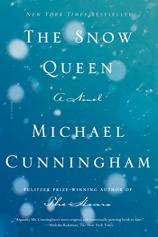The Snow Queen
Review
The Snow Queen
In Hans Christian Andersen’s fairy tale, “The Snow Queen,” a goblin creates a looking glass that distorts all that is virtuous and beautiful, making everything reflected in it appear low and ugly. After seeing how effectively it works, the goblin hatches a scheme to bring the looking glass to heaven to mock the angels with it. Instead, when the glass is shattered in its ascent, the shards that fall scatter everywhere, spreading misery to everyone. When a miniscule splinter lands in someone’s eye, his vision is instantly jaundiced and his view of life dimmed.
The characters at the heart of Michael Cunningham’s latest novel, THE SNOW QUEEN, are plagued by the distorting slivers of middle age, and the reckoning with the past, present and future that such a daunting fact of life can suddenly demand.
"Throughout the book, Cunningham portrays in a convincing, organic style the symbiotic nature of his characters’ relationships, the ways in which friends grow to become surrogate family members while siblings grow into surrogate parents."
In the book’s opening, Barrett Meeks --- 38 years old, gay, a prodigal son who has amounted to little --- has recently been dumped via a cold five-line text when he sees a light in the night sky over Central Park. The light seems to apprehend Barrett in the way he imagines “a whale might apprehend a swimmer, with a grave and regal and utterly unfrightened curiosity.” The vision shakes him to his core, but he keeps it to himself as he heads back to Bushwick where he lives with his brother, Tyler, a talented musician (with a hidden drug problem) who has failed to meet with any success, and Tyler’s bride-to-be, Beth, who co-owns a clothing shop. Beth is dying of cancer, and Tyler spends his days doing drugs, looking after Beth and trying to write the perfect song for her for their wedding. All of this is set against the backdrop of George W. Bush’s presidential re-election in 2004, and Cunningham skillfully uses it as a harbinger of stolen dreams and the failure of hope.
With his primary characters and their relationships established, Cunningham jumps ahead two years to New Year’s Eve, 2006. Beth’s cancer has miraculously retreated. Though grateful to still be alive, she feels a growing discontent and is haunted by a lack of purpose in what she’s doing with the gift of her second life. Meanwhile, without the role of caretaker to lend shape to his days, Tyler has fallen deeper into his drifting mode of existence while continuing his drug habit. And Barrett is still seeing a man named Sam, a nice enough guy, but not the stuff of great, romantic love.
Throughout the book, Cunningham portrays in a convincing, organic style the symbiotic nature of his characters’ relationships, the ways in which friends grow to become surrogate family members while siblings grow into surrogate parents. Whether working in short (at times too abrupt) chapters, as in the book’s opening, or later, in longer, more richly developed scenes, he illustrates the dense interconnectedness of lives lived in overlapping proximity, as well as the deeper psychic links that motivate and inform those lives. His prose is clause-laden, at times building toward satisfying peaks, at times merely piling up detail and crushing a fine point with redundancies. But for a book that hardly can be described as plot-driven, the style is well matched to the story.
If there’s a vexing problem, it’s that Cunningham seems to like his characters too much, as if he were afraid to harm them or make them suffer unduly. The breakups and deaths, the hurts, embarrassments and sober realizations that come in the book’s latter half happen offstage, or get neutralized in the relative safety of a character’s mind. As a result, most of what drama there is in THE SNOW QUEEN feels muffled beneath the folds of all that carefully constructed prose --- softened to inconvenience where it could have been heightened to a threat. While it doesn’t exactly ruin the book, it disappointingly diminishes what could have been a much better one.
Reviewed by Damian Van Denburgh on May 9, 2014
The Snow Queen
- Publication Date: May 5, 2015
- Genres: Fiction, Gay & Lesbian, Literary Fiction
- Paperback: 272 pages
- Publisher: Picador
- ISBN-10: 1250067723
- ISBN-13: 9781250067722





